|
|
|
Sort Order |
|
|
|
Items / Page
|
|
|
|
|
|
|
| Srl | Item |
| 1 |
ID:
181129
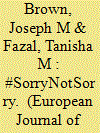

|
|
|
|
|
| Summary/Abstract |
States accused of perpetrating cyber operations typically do not confirm or deny responsibility. They issue ‘non-denial denials’ or refuse to comment on the accusations. These ambiguous signals are prevalent, but they are largely ignored in the existing cyber literature, which tends to treat credit claiming as a binary choice. The ambiguity of non-denial denials and ‘non-comments’ allows states to accomplish two seemingly opposed goals: maintaining crisis stability and leaving open the possibility of their involvement in the attack. By deliberately remaining a suspect, a state can manipulate rivals’ perceptions of its cyber capability and resolve. Refusing to deny responsibility can also shape rivals’ perceptions of allies’ capabilities, enhancing the credibility of deterrence. All of this can be accomplished without the escalatory risks that would come with an explicit admission of responsibility. Where previous research has focused on the dangers of escalation and the limitations of costly signalling with cyber, we show that non-denial denials and non-comments make cyber operations considerably more useful than the literature appreciates.
|
|
|
|
|
|
|
|
|
|
|
|
|
|
|
|
| 2 |
ID:
184042
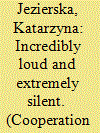

|
|
|
|
|
| Summary/Abstract |
In 2014, Sweden’s Feminist Foreign Policy (FFP) was announced with a fanfare. This article critically interrogates how Sweden implements the FFP through digital diplomacy by investigating the extent of Sweden’s gender equality activities on Twitter since the introduction of the FFP and by tracing gendered online abuse in digital diplomacy. I focus on Swedish embassy tweets towards two countries where feminism is highly contested – Poland and Hungary. The theoretical inspiration comes from discursive approaches to the spoken and unspoken, enriched by feminist observations about the non-binary character of voice/silence. The method applied is gender-driven quantitative and qualitative content analysis. The findings demonstrate that the FFP has not set any significant mark on digital diplomacy in the analyzed cases. The launching of the FFP went completely unnoticed and posts related to gender equality have actually decreased since 2014. There are no traces of ambassadors being subjected to gendered online abuse, but heavily xenophobic and paternalistic language is directed at Sweden as a representative of liberal policies. The article contributes to the literature on digital diplomacy by highlighting the (lack of) links between foreign policy and digital diplomacy and it addresses a gap by focusing on gender in digital diplomacy.
|
|
|
|
|
|
|
|
|
|
|
|
|
|
|
|
| 3 |
ID:
124029
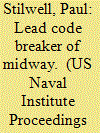

|
|
|
|
|
| Publication |
2012.
|
| Summary/Abstract |
An oral historian and former editor-in-chief of Naval History magazine takes us back seven decades, when U.S. Navy cryptanalysts had cracked the code of the enemy's radio traffic, resulting in one of the most decisive victories in military history.
|
|
|
|
|
|
|
|
|
|
|
|
|
|
|
|
| 4 |
ID:
179372
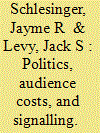

|
|
|
|
|
| Summary/Abstract |
Audience costs theory posits that domestic audiences punish political leaders who make foreign threats but fail to follow through, and that anticipation of audience costs gives more accountable leaders greater leverage in crisis bargaining. We argue, contrary to the theory, that leaders are often unaware of audience costs and their impact on crisis bargaining. We emphasise the role of domestic opposition in undermining a foreign threat, note that opposition can emerge from policy disagreements within the governing party as well as from partisan oppositions, and argue that the resulting costs differ from audience costs. We argue that a leader's experience of audience costs can trigger learning about audience costs dynamics and alter future behaviour. We demonstrate the plausibility of these arguments through a case study of the 1863–4 Schleswig-Holstein crisis. Prime Minister Palmerston's threat against German intervention in the Danish dispute triggered a major domestic debate, which undercut the credibility of the British threat and contributed to both the failure of deterrence and to subsequent British inaction. Parliament formally censured Palmerston, contributing to a learning-driven reorientation in British foreign policy.
|
|
|
|
|
|
|
|
|
|
|
|
|
|
|
|
| 5 |
ID:
121786
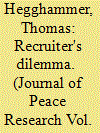

|
|
|
|
|
| Publication |
2013.
|
| Summary/Abstract |
How do terrorists recruit? We know much about the profiles and pathways of recruits, but little about the strategies and tactics of recruiters. Such procedures matter because they help determine who joins. I highlight a key determinant of recruiter tactics, namely, the tension between personnel needs and infiltration risks. Drawing on signalling theory, I present an analytical framework that conceptualizes recruitment as a trust game between recruiter and recruit. I argue that the central logic shaping recruiter tactics is the search for cost-discriminating signs of trustworthiness. Due to the context-specificity of signal costs and the room for tactical innovation, optimal recruitment tactics vary in space and time, but the underlying logic is the same for most groups facing a high threat of infiltration. I apply the framework to an al-Qaeda recruitment campaign in early 2000s Saudi Arabia, where it helps explain tactical preferences (why recruiters favoured some recruitment arenas over others) and differential network activation (why recruiters preferred war veterans over radical candidates from other networks). The trust dilemma also accounts for unexpected recruiter choices, such as their reluctance to solicit on the Internet and in mosques, and their preference for recruits who knew poetry or wept during prayer. Thus the signalling framework does not challenge, but provides a useful micro-level complement to, existing theories of recruitment.
|
|
|
|
|
|
|
|
|
|
|
|
|
|
|
|
| 6 |
ID:
186900
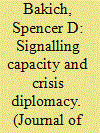

|
|
|
|
|
| Summary/Abstract |
In the 2017 U.S.-North Korea nuclear crisis, the Trump administration’s ‘maximum pressure’ strategy failed to achieve its objectives of the complete, irreversible, verifiable denuclearization (CVID) of the DPRK, and induced escalation pressures that brought the two countries to the brink of war. A deficit in signalling capacity (i.e. biased intelligence portfolio, lack of diplomatic-military integration, and inflexible military doctrine and war plans) prevented Washington from managing the crisis, creating the conditions for its strategic failure. The signalling capacity framework offers a comprehensive approach to explaining the outcome of the 2017 crisis, outperforming audience cost and brinkmanship theories.
|
|
|
|
|
|
|
|
|
|
|
|
|
|
|
|
| 7 |
ID:
173810
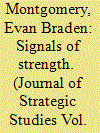

|
|
|
|
|
| Summary/Abstract |
States often use demonstrations to improve perceptions of their military power. This topic has received limited attention in the literature, which typically assumes that states disguise or downplay their capabilities, advertise them only to enhance their prestige, or use demonstrations to communicate interests and resolve. Because military strength can be difficult to gauge, however, successful deterrence and assurance can require demonstrations to ensure that capabilities are viewed as credible. This article explains the logic of capability demonstrations, identifies the conditions under which they have the most utility, introduces a typology of demonstration mechanisms, and describes how emerging technology influences demonstrations.
|
|
|
|
|
|
|
|
|
|
|
|
|
|
|
|
| 8 |
ID:
183710


|
|
|
|
|
| Summary/Abstract |
On 26 March 2020, the leaders of the Group of twenty major economies (G20) convened in an emergency virtual meeting to discuss the extraordinary situation facing the world. Virtual summitry provided a stark visual contrast to the traditional staging of modern multilateral diplomacy – leaders were suddenly responsible for their own staging, leaving them with new opportunities to create a favourable impression of how they, and their respective state, would be seen. Taking the disruption of virtual summitry as a starting point, we focus on the resulting new opportunities for visual diplomacy. We draw on the symbolic interactionism of Erving Goffman and we argue that status signalling in this context was based on a shared understanding of the symbols and resources that have social value in the interaction order of summit diplomacy. Based on a visual analysis of 51 photographs from the G20 video conference, we find that the visual performances during the extraordinary meeting reflected evident, but not necessarily intentional, attempts at status seeking. The article thus contributes to an increased understanding of how visual performances contribute to uphold status distinctions in multilateral diplomacy.
|
|
|
|
|
|
|
|
|
|
|
|
|
|
|
|
|
|
|
|
|